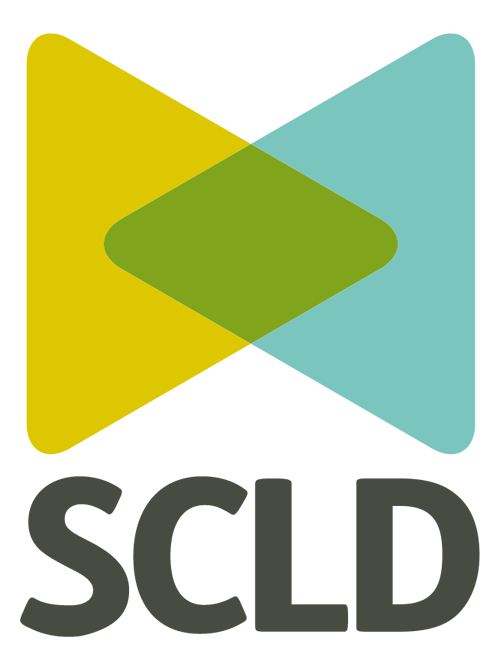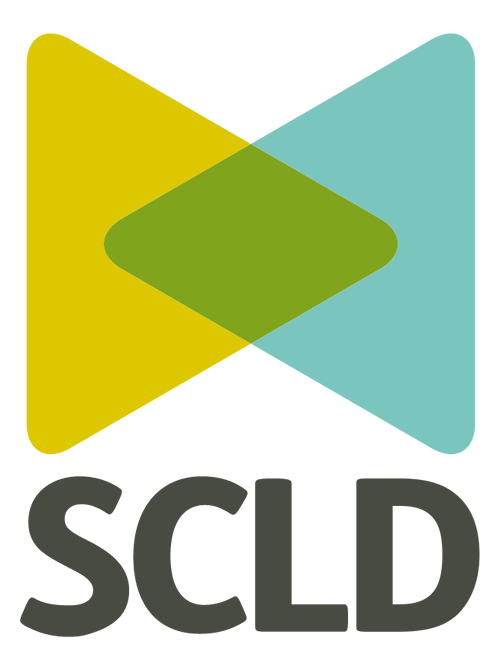
A wee blether with… Margaret Smith, Principal Officer for Employment & Training at Falkirk Council
SCLD went to meet with Margaret Smith who manages a small, but dedicated team at Falkirk Council working to help people who need additional support to find employment.
Nice to meet you Margaret. What is it that you like best about your day-to-day job?
Hi there, nice to meet you too! I manage a small team of people who predominantly support people with learning disabilities and autism into employment.
What’s the best part of your job?
Working with people and finding strategies to help staff to look at problems in a different way. We help each other to find solutions and see them from a different perspective. The staff come from all different backgrounds – some of them have worked with people with learning disabilities before, whereas some have worked with the homeless or people with substance misuse issues – so it’s interesting to see the different ways we approach things.
I enjoy meeting people and learning about their different needs and points of view, and then trying to find the best job I can for them.
I enjoy helping people with a learning disability, autism or additional support needs get the job they want to get!
How do people get to your service?
The majority travel by themselves but some people need support and will bring a parent or use a tool like travel training for example. Then we quite quickly try and get them to come along themselves, because we want the real picture of what that person’s needs are and what they are looking for in a job.
Often parents and supporters have their own suggestions and concerns about the person going into employment, which is understandable. Usually after 2 weeks or so, we meet with the person on their own – we start by working to understand their communication needs and then we can get to know them and work out the next steps.
We developed different communication tools to help people to tell us what they want in terms of a job and to make decisions.
Can you tell us about the communications tools you have developed?
Well it started off with the Falkirk Council letters – they all look very similar and we found that people weren’t reading the letters and were missing appointments with the employment service. So we started to include a picture of me (or whoever would be organising the appointment) next to the time of the appointment on the letter.
Then we moved on to documents that we had – we started to put them into an easier form so that people could read them more easily. Then we moved onto Talking Mats – which is a thinking tool, or that’s how we describe it – Talking Mats uses a series of pictures, usually presented in a row to ask a series of questions, which helps people make decisions and talk about how they feel. It helps us focus on the kind of job they would want to do, without just taking the first thing someone might say at face value. For example someone might say “I’d really love to work in a hospital” but then through the Talking Mats you find out that they don’t like wearing a uniform – so it’s a very useful tool for us to find out what people want.
The way a person responds to Talking Mats also gives us a really useful guide to how much they’ve thought about something before – it gives us a clue into how self-aware they are in terms of finding work – if they’re really indecisive we know that we need to give more support to help them find what they want.
We found that everyone who came to us found their skills, health conditions and their work preferences the most difficult to communicate, so tools like Talking Mats really helped us to drill down and assess people’s needs as well as understanding what they wanted from a job, such as the kinds of places they would like to work: outside or inside, noisy or quiet… those kinds of things.
Once you know what someone wants to do as a job, what happens next?
So our Employment Training Coordinator, Peter, will look at what’s available and what best matches the person’s needs, give them a few options and then the person will pick what they most like the sound of. They then will go for a work trial to see how they like the role and whether it’s suitable. Peter does the initial introductions and sets the work trial up, then an Employment Support Worker will be with the person as they’re on their work trial, so they will then take over and show the person how to do the job.
Employment Support Workers are trained in the job role before the person comes in to start their work trial, so they can show the person how to do everything and provide the support that’s needed without the company needing to allocate a staff member to do this. We find that companies really appreciate this as sometimes it can be quite bewildering for them, especially if they’ve never employed anyone with additional support needs before. Employment Support Workers are also trained in Systematic Instruction (a structured, step-by-step approach to teaching skills) so they can work out how the person needs to be taught and then train them up.
The hardest thing we find, especially for production line-type roles, is speed – people are too fast or too slow for the production process. So often breaking things down into simple steps so people can see and understand the process is a way to solve this problem. For example we often set up work trials in a local bottling plant – so we would use Systematic Instruction to break down each step of the bottling process so people know their role and how it fits into the finished product.
It’s different for everyone as it just depends what their capabilities are – we like to take a person-centred approach.
Can you tell us about some of the projects you have running?
Sure. There is DFN Project SEARCH – an employment programme for people with a learning disability – it’s an international programme but in Falkirk it runs in partnership with SERCO, the NHS and Forth Valley College. People do 3 internships running for 10 weeks, so they might have a go at being a hospital porter, then in domestic and then they’ll go on to catering. They might not work across all areas of the hospital – it just depends on what they want to do and what they feel comfortable with.
There’s a Job Coach and Senior Lecturer on-site with them at the hospital to make sure everyone is supported. They also get a ‘Job Buddy’ when they start to keep them on track.
They also do SERCO care training, NHS training (such as Health & Safety, Fire training etc.)
The best thing is seeing the progression – the buddies and Job Coaches have to mark them as the internship goes on and at the end they decide whether they are ‘job ready’. If a person is marked as ‘job ready’ then they can put in a notice of intent – which just means that if a vacancy comes up at the Hospital they will put in an application.
Are you involved in interview prep and support?
I’m involved in putting together visual CVs, if people decide that’s something they want to do.
We’re now looking at trying to promote the use of the ILF Scotland Transition Fund to buy things like iPads which people can then use to show potential employers their visual CVs and videos to demonstrate what skills they have. A lot of people with a learning disability and/or autism find it easier to show a video of them doing something rather than processing and answering an interview question.
We’re keen to get employers to let people do work trials first before an interview, as we find this is more effective, to let employers see what they can do.
What does a work trial look like?
It varies for each person – for example we had one person who went in for a 2-day trial at a local bottling plant and it was clear to the employer by the end of those two days that they were capable of doing the job. Another person had a work trial which ran over 4 weeks, because it took that length of time to ensure that the employer was satisfied that they could do the work.
They are also a really useful way of working out whether a person is capable of doing the job and also whether they want to do that particular job. It’s less formal than an interview – it’s a case of “can I show you me first!?” before an interview which is not always the best setting for someone to show their skills.
The length of a work trial also depends on things like funding and support too.
Do you find that work trials are successful?
Well we’ve had 10 work trials which have resulted in 9 jobs in the last 4 weeks!
Wow! Very successful then. What is it that you think employers gain by employing someone with a learning disability and/or autism?
It diversifies their workforce and promotes inclusion.
I think a lot of people are quite wary of people who are different to them in any respect and it just means that you miss out on the skill-set that someone has got. Because everyone has skills, no matter what health condition or disability they might have.
I think on the whole employers think that they’re going to have more absence when they employ someone with a learning disability or additional need, and then it turns out that they have less, and they find that people are very loyal.
Employers also find that people who have been trained using Systematic Instruction will do the job how they’ve been trained to do it, rather than any way they want to. So there are far fewer problems than they initially imagine when they consider hiring someone with a learning disability – in fact they discover that there are lots of benefits!
Sometimes it’s actually the lack of awareness about different disabilities amongst employers that is the biggest barrier to people finding work. We’re currently putting together a pack for employers to help myth-bust and also to increase understanding around employing someone with a disability – particularly a learning disability and/or autism.
I think a lot of people are quite wary of people who are different to them in any respect and it just means that you miss out on the skill-set that someone has got. Because everyone has skills, no matter what health condition or disability they might have.
We know an information pack won’t go far enough – everyone with a disability is an individual and has specific needs when it comes to finding and maintaining employment. It’s about finding strategies to help employers to break down those initial barriers to employing someone with a learning disability and then supporting them and their employee as they move forward together.
How do you support employers?
We’re working on doing research amongst the employers we currently work with – we have an Employer Engagement Team, so at the moment they’re at the point of asking what employers want from us, then we’ll work to try and develop and tailor our support around that.
We’re really at the beginning of this.
We also support employers through Fairstart Scotland, which is a Scottish Government employability programme that enables us to support a person to find a job for a year, and then to support them in work for a year. Supporting them in work is really important because getting someone into work is one thing, but helping them to sustain it often requires more support. Fairstart allows us to support employers – so it’s not like we’re putting someone into a job and then leaving the employer – through Fairstart the employers and employees don’t feel abandoned once the contract starts.
It can be really helpful when, for example, someone has to learn a new skill on top of the job they’re already doing – then the Employment Support Worker can go in and teach them the new bit of their job and then you’re not expecting the employer to instinctively know how to teach someone with a learning disability or additional support needs how to do something new. Support during that first year is really important.
What is your hope for the future in terms of people with a learning disability and or autism/additional support need and employment?
That they’re treated in the same way that everybody else is treated.
But also inclusive communication is a big thing for me. Everything we see in terms of getting a job seems to involve lots of written work which takes a lot of people out of the picture before they’ve even begun.
There are lots of people in work without a specific communication or support need that might not be strong in a certain skillset that their job requires – but they have strategies to cope with this so that they can do their job.
That’s all we do – give people strategies so that they can do their job.
In the future I would just like people to be given the opportunity to get a work trial and for that to be the norm.
I have worked in the employment and training sector for a long time and I’ve interviewed a lot of people – you don’t always get the right person when you’ve only got a certain amount of time or questions to assess that person for the job. Interviews only show you how good someone is at conversing, they don’t tell you how someone will be in the workplace, whether they will get on with other colleagues, whether they can do the job, whether they understand it. So work trials would be a much better way forward for people with a learning disability and/or autism.
We also do some work going into schools which we are planning to do more of – with the S6s. This started because we found that by the time most people came to our service they were 21 or 22, had maybe just finished a college course and had forgotten the achievements or skills they had when they were at school. So we thought making contact with people who potentially might use our service when they were older and getting them thinking about what they want in terms of employment at a younger age was a good approach.
If people wanted to get in touch with you about supporting people with a learning disability and/or autism into employment (or if there is someone looking to get into employment themselves)?
They can phone our Falkirk Council Employment and Training Unit on 01324 504400 or email etu@falkirk.gov.uk.
We want to try and make ourselves as accessible as possible to people with a learning disability and/or autism who are looking to get into employment. We’re currently working on our website accessibility and have had an accessibility audit by SUSE, so this will be updated very soon!
Thank you to Margaret Smith and Falkirk Council.


